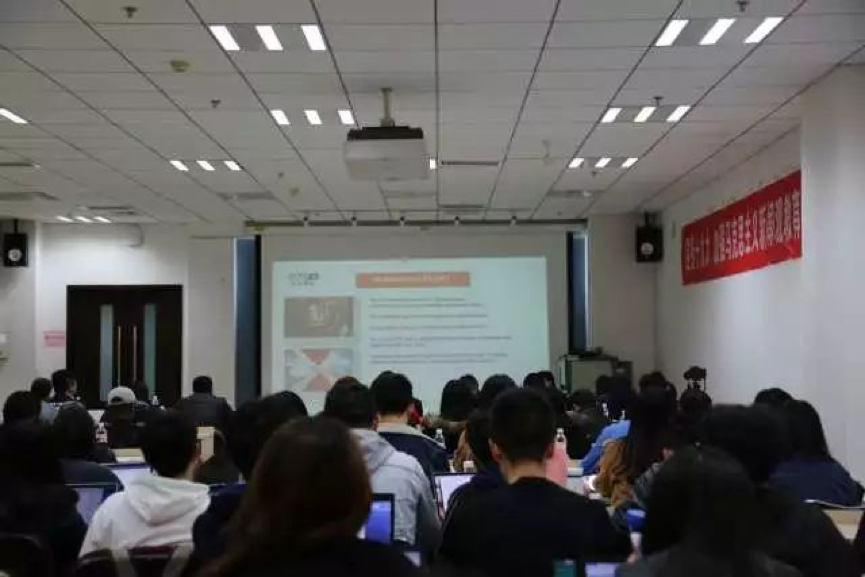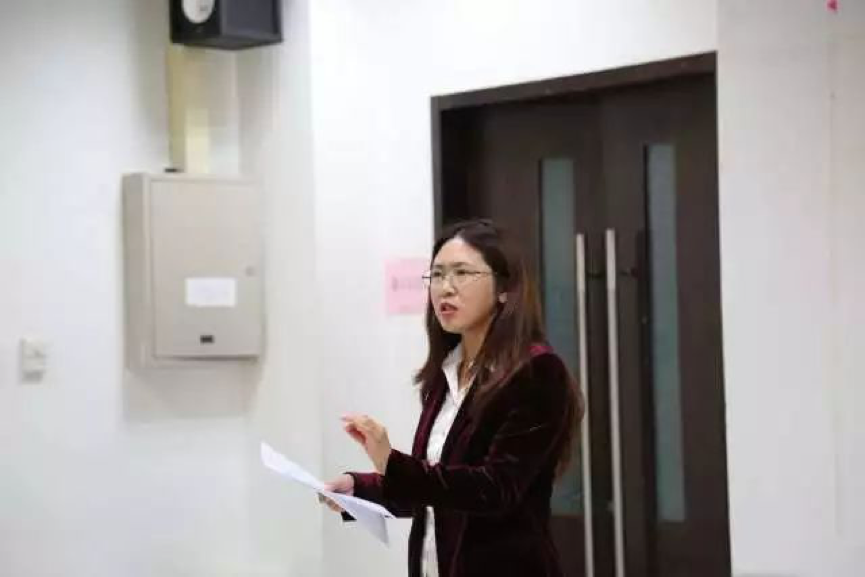On 2nd November, a conference for exchange among Chinese and foreign media titled “Exchange on International Media Cooperation: Modes and Opportunities” was held in the School of Journalism and Communication of RUC. This conference is the fourth media salon hosted by China-Africa Press Center and China-South Asia and Southeast Asia Press Center and organized by the School of Journalism and Communication.

Cao Yue, a senior executive editor of Asia Today from CCTV, Ma Shaoyong, Overseas Public Relation Director from Brand Marketing department of Star Times, and Wu Yamin, Associate Senior Editor of China Intercontinental Press attended the conference along with 42 foreign journalists from 39 countries of Africa, South Asia and Southeast Asia and 50 students of the School of Journalism and Communication. Professor Zhong Xin from RUC presided over the conference.

Professor Zhong Xin presided over the conference
The salon comprised two parts: lectures and group discussions. In the first part, four foreign journalists and three Chinese media professionals introduced the idea and specific projects of international cooperation of their organizations, analyzed the space for and modes of cooperation between Chinese foreign media and shared their experiences and gains about international media cooperation. They also answered questions brought up by the moderator, other journalists as well as the students.
Cao Yue, a senior executive editor of Asia Today from CCTV, introduced the production process of EYES ON CHINA and her personal experiences of it, which is a program of Asia Today in 2017 involving a large scale of international cooperation in footage shooting and broadcasting. According to Cao Yue, EYES ON CHINA invited 10 journalists from mainstream media of 9 Asian countries. They covered major projects and prominent enterprises in China including AI, Hong Kong-Zhuhai-Macao Bridge, high-speed train, online business and C919, to explore the Chinese wisdom, Chinese solutions and Chinese spirit embedded in them. Cao Yue told stories about her experiences working with journalists from Cambodia, Pakistan and Japan, illustrating the importance of international media cooperation in promoting exchange and understanding across borders. She was also looking forward to further cooperation with present journalists
Ung Kaneka, a Cambodian journalist from TVK, shared information about her TV station and international media cooperation conducted there. She introduced the procedure of her work and the cooperation between CCTV and TVK. On 20th September, a memorandum of a Sino-Cambodian collaborative documentary was signed in Cambodia with Liu Yunshan, a member of the Standing Committee of the Political Bureau, and the Vice-premier of Cambodia present. Ung Kaneka said that international media cooperation was significant for the development of human resources and technology of Cambodia.
Wu Yamin, Associate Senior Editor of China Intercontinental Press, introduced the work carried out by China Intercontinental Press and China Intercontinental Center. She also introduced the latest project called “China Bookshelf” and the digital platform project called “that’s”. She said that the books published by China Intercontinental Press are mostly foreign language books introducing China. The press has created new media platforms in Spanish, English and Arabic to tell the world stories about China. Wu Yamin also introduced the international cooperation and achievements of China Intercontinental Center in the field of film and television, including sino-foreign co-produced programs such as “China Above” and “Chinese Spring Festival” which attracted attention on the Internet. Furthermore, she introduced the working systems of the “Belt and Road” Media Communication Alliance launched by China Intercontinental Press and its subsidiary Silk Road Television Transnational Alliance Network. She hoped to deepen cooperation with other countries in program co-production, media resource exchange, technology research and development and talent training under the concept of “co-construction, discussion and sharing”.
Ronald Lwere Kato, a Ugandan journalist from New Vision expressed his opinions on the initiative to build a large-scale layout of African news and his vision for the construction of the Pan-African Multimedia News Website. He believed that the establishment of this website will enrich the content and diversity of the African journalism industry and help African countries understand each other. Kato said that the world is becoming increasingly connected, and the Belt and Road Initiative offers great opportunities for African media to cooperate with Chinese media. African media can enhance Chinese people’s understanding of African countries and deepen African people’s understanding of Chinese development policies and roads through a series of China-Africa media cooperation projects. He also systematically analyzed the potential space for cooperation between Chinese and African media and the advantages of African media.
Ma Shaoyong, Overseas Public Relations Director from Brand Marketing Department of Star Times made a speech about “ The Cooperation with Countries from Africa, South Aisa and Southeast Asia”, “Cooperation with Media, Technology Network Platform” and “The Construction of Platform Content”. He introduced that there are 480 channels covering topics in different fields in Star Times, broadcasting to the whole Africa in 10 languages. In the era of digitalization, the transnational communication ability of Star Times saved great investment and operating costs for media partners and satisfy audience's requirements about clear audio and image quality for the user experience.
Asante, a Ghanaian journalist from the Daily Graphic, talked about the necessity of international media cooperation. Sharing examples about media exchanges and his own experience in the China-Africa Press Center program organized by the China Public Diplomacy Association, he said that the collision of ideas and cultural exchanges in the international media cooperation was helpful for journalists to open their mind to the outside world and grasp the trend of new technologies. He hoped that China and Africa could make more efforts to deepen bilateral media cooperation, like connecting the two peoples through joint reporting as well as promoting the construction of African countries through the Belt and Road Initiative. He believed the international community needed to strengthen cooperation and media should set an example for that.
Bangladeshi journalist Jubair Hasan from Financial Express mentioned why international media cooperation is particularly important to China. He mentioned the Belt and Road Initiative encouraged more Chinese investors to go abroad, so China needed to establish cooperative relationships with the media of the country where it invests in order to clearly know the investment environment and guide foreign people to fully understand China's policy. Hasan said that under the framework, international media cooperation had greatly reduced the cost of communication between countries.
In the discussion session, Malawi journalist Sandu asked why most journalists in CCTV focused on Asian media. Cao Yu stated that as an Asian program, Asia Today mainly cooperate with Asian media. She suggested that other CGTN channels could follow the pattern of Asia Today and work with African media or other regional media to show eyes on China. She also welcomed foreign media to invite Chinese journalists to experience their country and cover stories.

Discussion session
Students also asked questions about the challenges faced by international media cooperation. Ma Shaoyong said that the biggest challenge was the barriers of communication and understanding of partners resulted in cultural differences and background differences. Kato believed that these differences helped us to complement each other. If everyone was similar, the cooperation would not be that significant. He emphasized it was those differences that made international media cooperation more and more important. Jubair Hasan pointed out that we should cooperate cross the boundaries between countries and aim at common interests. Asante believed that although there were still differences between countries, media cooperation was a good way to eliminate it.
The Q&A lasted for more than half an hour. Journalists answered various questions from colleagues and students in the lively discussion.
Written by Xie Jianing
Photo by Liang Hanbin
Edited by Wanzhen & Wang Han



